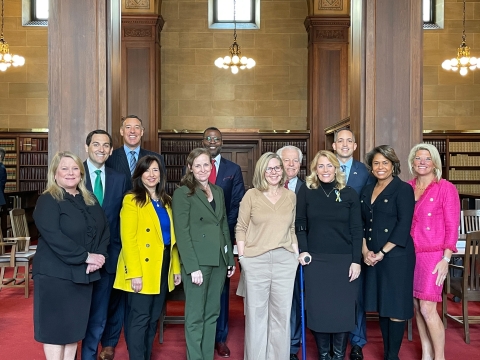Travel Leaders and U.S. Department of Commerce Meet to Foster Industry’s Recovery

The U.S. Travel Association led a delegation of 11 travel industry leaders to Washington, D.C., March 8 for a roundtable discussion with U.S. Deputy Secretary of Commerce Don Graves on ways to bolster the industry’s recovery in the wake of the COVID-19 pandemic.
The discussion centered on promoting safe business and professional travel and identifying opportunities to help all aspects of the travel and tourism sector, including professional meeting and events, fully and evenly recover.
At the meeting, Graves voiced his support for the industry, saying the U.S. Department of Commerce will bring “all tools to the table” to help overcome obstacles that remain to the normal resumption of business travel, both domestically and from abroad.
Discussion topics ranged from the reentry of urban office workers and its correlation to the restart of business travel to the distinctions of professionally produced meetings and events, as well as opportunities to attract global meetings, conventions and exhibitions to the U.S.
Roger Dow, president and CEO of U.S. Travel, applauded its federal partners for their focus on rebuilding business and professional travel and their commitment to restoring this sector of the U.S. economy and workforce.
“The travel industry is seizing every opportunity extended to quickly recover—particularly as business travel, conferences and conventions, and trade events nationwide continue to lag,” Dow said. “Special thanks go to Deputy Secretary Graves for meeting with our industry today and offering the agency’s support as well as to Secretary Gina Raimondo for her leadership on rebuilding America’s travel economy.”
The most recent statistics show that total business travel in 2021 was just 47% of 2019 levels, and group meetings and events were 36% of 2019 levels. Based on the latest U.S Travel forecast, business travel recovery is not expected until 2024.
Following the roundtable, Dow was optimistic that government and industry can work hand in hand to more quickly restore the travel sector.
“A complete recovery of the U.S. economy is directly related to the full and even recovery of America’s travel industry,” he said, encouraging the administration and government officials to send consistent and clear messages to the American public and the world that it is safe to travel again, particularly for vaccinated individuals.
Following are some of the policies that U.S. Travel and its Meetings Mean Business Coalition recommends.
- The creation of temporary tax incentives to encourage business travel and spending on entertainment services
- The creation of a partnership with U.S. destinations and venues to help secure high-value international meetings, incentives, conferences and exhibitions
- The repeal of the pre-departure testing requirement for all fully vaccinated inbound international arrivals
- Additional H-2B, J-1 and other temporary work visas available to meet seasonal workforce needs, among others
- Restoring visa services and taking steps to modernize the visa process—including waiving interviews for low-risk renewals, allowing videoconferencing and/or offering group visa processing.
Attendees at the U.S. Department of Commerce roundtable were:
- Don Graves, deputy secretary of commerce
- Roger Dow, president and CEO, U.S. Travel Association
- Tori Emerson Barnes, executive vice president of public affairs and policy, U.S. Travel Association
- Julie Coker, president and CEO, San Diego Tourism Authority
- Christine Duffy, president, Carnival Cruise Line; national chair, U.S. Travel Association
- Elliott Ferguson, president and CEO, Destination DC
- Susan Fox, senior vice president, government relations, The Walt Disney Company
- Walt Leger, general counsel and incoming president and CEO, New Orleans & Company
- Meghan Ludtke, managing director, regulatory affairs, American Airlines
- Michael Massari, chief sales officer, Caesars Entertainment; co-chair, Meetings Mean Business Coalition
- Sara Nelson, international president of the Association of Flight Attendants
- Martha Sheridan, president and CEO, Greater Boston CVB; co-chair, Meetings Mean Business Coalition
Don’t miss any event-related news: Sign up for our weekly e-newsletter HERE and engage with us on Twitter, Facebook and LinkedIn!


Add new comment